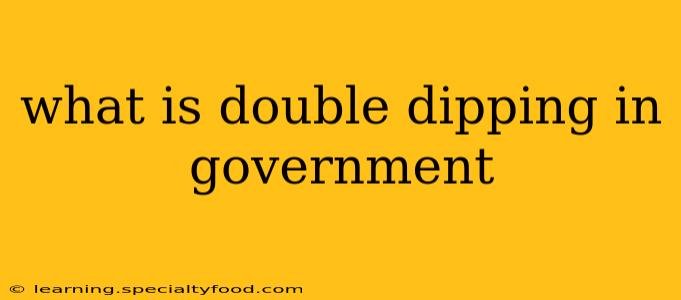Double dipping in government refers to the practice of collecting two public sector pensions simultaneously. This often occurs when an individual retires from one government position and then takes another government job, allowing them to draw a pension from their previous service while earning a salary from their new role. While not illegal in all cases, it's a practice that often sparks public debate and controversy due to ethical and financial considerations.
This seemingly simple definition belies a complex reality, with different rules and perceptions across various jurisdictions and levels of government. The ethical implications hinge on whether the individual is truly "retired" while drawing a pension or simply transitioning between government roles. Furthermore, the financial implications can be substantial, particularly in cases involving high-ranking officials with substantial pension entitlements.
Is Double Dipping Always Wrong? Exploring the Nuances
The morality and fairness of double dipping are frequently debated. Some argue that it represents a misuse of taxpayer money, rewarding individuals twice for the same period of service. They might highlight instances where individuals move from one well-paid government job to another, essentially receiving a "bonus" pension on top of a new salary. This fuels the perception of government excess and a disconnect between public servants and the taxpayers who fund their pensions.
Conversely, others argue that double dipping is acceptable in certain circumstances. For example, if an individual retires from one position but subsequently accepts a significantly different or lower-paying role, the combined income might not be excessively high. Moreover, some argue that the experience and expertise of these individuals are valuable assets that benefit the public sector, justifying the continued employment even with a pension. Finally, some argue that the terms of pension schemes should be clearly defined and upheld, and that if a scheme allows for double dipping, then it should not be considered ethically problematic.
What are the Different Types of Double Dipping?
While the core concept remains the same, several nuances exist within double-dipping:
- Simultaneous Pensions: This is the most common form, where an individual receives a pension from a previous government job while employed in a current one.
- Pension Spiking: This involves manipulating salary in the final years of service to inflate the pension amount. While not strictly double dipping, it's a closely related practice often viewed as equally problematic.
- Golden Handshakes & Pensions: Receiving a generous severance package ("golden handshake") upon leaving one government position and then immediately taking another role while drawing a pension. This combines the benefits of both severance and a concurrent pension.
How is Double Dipping Regulated?
Regulations governing double dipping vary considerably by country, state, and even specific government agencies. Some jurisdictions have explicitly banned the practice, while others allow it under specific conditions or with limitations. The lack of uniform regulation across different government levels adds to the complexity and makes it difficult to assess the overall impact of this practice.
What are the Potential Solutions?
Addressing concerns over double dipping requires a multi-faceted approach. This includes:
- Greater Transparency: Publicly disclosing pension arrangements and salary details of government employees.
- Stricter Regulations: Implementing clearer and more consistent rules across government levels to limit or eliminate double dipping.
- Independent Oversight: Establishing an independent body to review and monitor pension schemes and practices to ensure fairness and accountability.
- Public Debate and Awareness: Engaging in open discussions to clarify ethical concerns and forge a consensus on acceptable practices.
Frequently Asked Questions
What is the difference between double dipping and pension spiking?
While both are viewed negatively, double dipping is collecting two pensions simultaneously, while pension spiking manipulates salary before retirement to boost pension payouts.
Is double dipping illegal in all cases?
No. Legality varies across different jurisdictions and specific government schemes. Some jurisdictions explicitly forbid it, while others allow it under specific circumstances.
How common is double dipping in government?
The prevalence of double dipping is difficult to quantify precisely due to inconsistencies in reporting and regulation across different jurisdictions. However, it remains a recurring issue that generates significant public discussion.
What are the ethical implications of double dipping?
The main ethical concern is the potential for misuse of taxpayer money and a perception of unfairness towards taxpayers. The fairness is heavily dependent on the specific circumstances of the individual's transition between government roles and the total compensation received.
By understanding the nuances of double dipping and engaging in a thoughtful discussion, we can strive for greater transparency and accountability in government pensions. This is vital for maintaining public trust and ensuring the responsible use of taxpayer funds.
